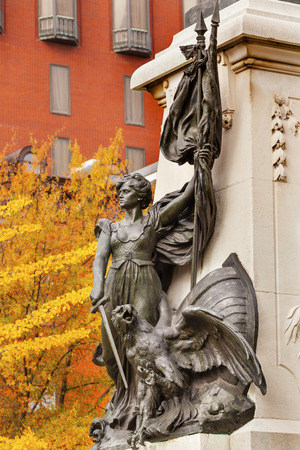 Arthrex, Inc. v. Smith & Nephew, Inc., No. 2017-1239, 2018 U.S. App. LEXIS 1737 (Fed. Cir. Jan. 24, 2018) (Before Newman, Dyk, and O’Malley, J.) (Opinion for the court, Dyk, J.) (Concurring opinion, O’Malley, J.) (Dissenting opinion, Newman, J.).
Arthrex, Inc. v. Smith & Nephew, Inc., No. 2017-1239, 2018 U.S. App. LEXIS 1737 (Fed. Cir. Jan. 24, 2018) (Before Newman, Dyk, and O’Malley, J.) (Opinion for the court, Dyk, J.) (Concurring opinion, O’Malley, J.) (Dissenting opinion, Newman, J.).
Smith filed an inter partes review (“IPR”), challenging claims 1–9 of U.S. Patent No. 8,821,541 (“the ‘541 patent”) belonging to Arthrex. Before the Patent Trial and Appeal Board (“Board”) issued a decision, Arthrex disclaimed claims 1–9 under 37 C.F.R. § 42.107(e) and filed a Preliminary Response which stated that its statutory disclaimer was not a request for adverse judgment. Arthrex argued that no IPR should be instituted because the statute states “[n]o inter partes review will be instituted based on disclaimed claims.” The Board’s decision included an adverse judgment that estopped Arthrex from asserting similar claims in certain continuation applications. On appeal, Arthrex challenged whether the Board properly entered an adverse judgment under 37 C.F.R. § 42.73(b). Smith challenged whether the adverse was appealable.
Smith argued that 35 U.S.C. § 319 only provides review from a final written decision, not an adverse judgment. However, § 319 is not the only basis for an IRP appeal. For instance, 28 U.S.C. § 1295(a)(4)(A) provides jurisdiction over “an appeal from a decision of—the Patent Trial and Appeal Board … with respect to … inter partes review under title 35.” The Federal Circuit held that an adverse final judgment that disposes of an IPR proceeding is a “decision” and is therefore appealable.
Section 42.73(b) gives the Board authority to construe a patent owner’s actions as a request for an adverse judgment, which indicates that the Board’s characterization is determinative. Arthrex pointed to statutory language that, “[c]ancellation or disclaimer of a claim such that the party has no remaining claim in the trial” (emphasis added). Thus, according to Arthrex, an adverse judgment can only be granted if an IPR has been instituted. However, the Federal Circuit noted that the statute allows a patent owner to request an adverse judgment at any time during a “proceeding.” A “proceeding” is “a trial or preliminary proceeding, [which] begins with the filing of a petition for instituting a trial.” 37 C.F.R. § 42.2. Moreover, the purpose of § 42.73(b) is to define the estoppel provision of § 42.73(d), which makes no meaningful distinction between claims cancelled before an IPR proceeding and claims cancelled after [during?] an IPR proceeding. Patent Owner’s self-serving statement that no adverse judgment is requested is not binding on the Board
Judge O’Malley’s Concurrence
Judge O’Malley concurred, agreeing that the Board’s interpretation of 37 C.F.R. § 42.73(b) is consistent with the text of that regulation. She wrote separately to point out her doubts about whether the Director had the authority to issue that regulation and whether the regulation was properly promulgated.
Judge O’Malley noted statutory issues with the case that the parties did not raise. Section 42.107(e) states, “no inter partes review will be instituted based on disclaimed claims.” Facebook, Inc. v. Skky, LLC stands for the proposition that covered business method review cannot be instituted based on statutorily disclaimed claims. Judge O’Malley questions why an IPR would be different. She also questioned the PTO’s expansive definition of “trial” as “proceedings,” and opined that an IPR does not begin until it is instituted.
Judge Newman’s Dissent
Judge Newman dissented. PTO regulations define a “trial” as meaning “a contested case instituted by the Board based upon a petition” (37 C.F.R. § 42.2), not a “proceeding.” Because no trial occurred, the Board had no authority to issue an adverse judgment. Additionally, she noted the importance of ensuring that agency regulations comply with governing statutes. Her view is that the AIA was designed so that, when institution is denied, the IPR does not proceed to trial and final decision, and the consequences of a final decision do not arise.
Take Away
A final adverse judgment by the PTAB is appealable. A disclaimer of challenged patent claims before an IPR is instituted may result in a final adverse judgment against the patent owner, triggering estoppel provisions that preclude the assertion of other claims that are not patentably distinct from those disclaimed.
[Troutman-Ad]
[Troutman-About]

![[IPWatchdog Logo]](https://ipwatchdog.com/wp-content/themes/IPWatchdog%20-%202023/assets/images/temp/logo-small@2x.png)


![[Advertisement]](https://ipwatchdog.com/wp-content/uploads/2024/04/UnitedLex-May-2-2024-sidebar-700x500-1.jpg)
![[Advertisement]](https://ipwatchdog.com/wp-content/uploads/2024/04/Artificial-Intelligence-2024-REPLAY-sidebar-700x500-corrected.jpg)
![[Advertisement]](https://ipwatchdog.com/wp-content/uploads/2024/04/Patent-Litigation-Masters-2024-sidebar-700x500-1.jpg)

![[Advertisement]](https://ipwatchdog.com/wp-content/uploads/2021/12/WEBINAR-336-x-280-px.png)
![[Advertisement]](https://ipwatchdog.com/wp-content/uploads/2021/12/2021-Patent-Practice-on-Demand-recorded-Feb-2021-336-x-280.jpg)
![[Advertisement]](https://ipwatchdog.com/wp-content/uploads/2021/12/Ad-4-The-Invent-Patent-System™.png)






Join the Discussion
No comments yet.